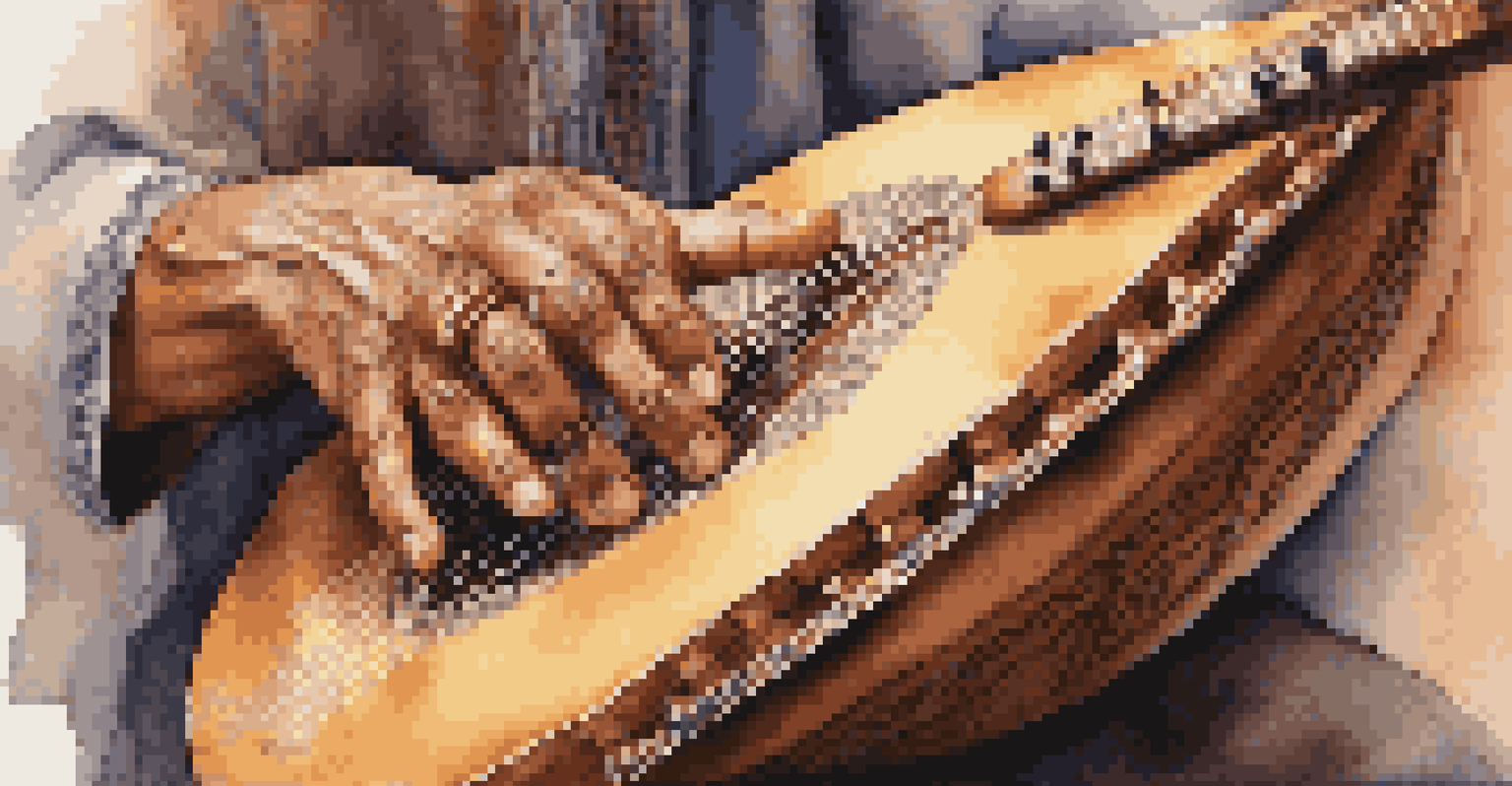The Relationship Between Music and Cultural Identity

Music as a Mirror of Cultural Heritage
Music serves as a powerful reflection of cultural heritage, showcasing traditions, beliefs, and values. Each genre often carries historical significance, weaving the stories of its people into rhythms and melodies. For instance, folk music often encapsulates local tales, customs, and even struggles, preserving them for future generations.
Music is the soundtrack of your life.
When we listen to music from different cultures, we can experience a glimpse into their world, understanding their perspectives and histories. This connection is evident in genres like reggae, which originated from the struggles of the Jamaican people, or Native American music, which often incorporates nature and spirituality. These sounds tell stories that words alone might fail to convey.
Moreover, music can evoke feelings of nostalgia and belonging, connecting individuals to their roots. Through songs passed down through generations, families can celebrate their lineage, ensuring that cultural identities remain vibrant and alive.
Cultural Identity and Musical Genres
Different musical genres often emerge from specific cultural contexts, influencing how identity is expressed. For example, hip-hop sprang from African American urban communities, providing a voice to social issues and personal experiences. Its unique beats and lyrical styles reflect a collective identity shaped by history and environment.

Similarly, traditional music genres such as bolero or flamenco are inextricably linked to their cultural origins, showcasing distinct instruments, rhythms, and themes that resonate with the people. These genres not only entertain but also serve as a canvas for cultural expression, allowing artists to depict their identity and experiences.
Music Reflects Cultural Heritage
Music serves as a powerful reflection of cultural heritage, weaving the stories, traditions, and values of diverse communities into its rhythms and melodies.
As globalization increases, the fusion of musical genres can lead to the creation of new identities. This blending allows individuals to explore and redefine their cultural affiliations, resulting in innovative sounds that reflect a hybrid identity.
Music as a Tool for Cultural Preservation
Music plays a crucial role in the preservation of cultural identity, especially in an ever-globalizing world. When traditional songs are performed, they keep the culture alive, ensuring that younger generations understand and appreciate their heritage. Events like cultural festivals often showcase these performances, drawing communities together.
Without music, life would be a mistake.
Moreover, music can serve as a form of resistance against cultural erasure. For instance, artists in indigenous communities use their music to advocate for their rights and raise awareness of their struggles. Through their songs, they assert their identity, countering narratives that seek to diminish their culture.
The rise of digital platforms has further amplified this preservation effort, allowing artists to share their traditional music with global audiences. This accessibility helps to educate others about diverse cultures, fostering appreciation and respect for different identities around the world.
The Role of Music in Cultural Rituals
Many cultures incorporate music into their rituals and ceremonies, highlighting its significance in shaping identity. From weddings to religious ceremonies, music enhances these experiences, providing emotional depth and connection. The melodies and lyrics often carry profound meanings, resonating with the cultural values of the participants.
For example, in many African cultures, drumming is integral to rituals, symbolizing community and togetherness. The rhythms often dictate the flow of the ceremony, guiding participants through different emotional states. This use of music not only reinforces cultural identity but also strengthens community bonds.
Cultural Identity Through Genres
Different musical genres arise from specific cultural contexts, influencing how individuals express their identities and experiences.
Additionally, music can serve as a unifying force during communal gatherings, where everyone participates in singing and dancing. These shared experiences foster a sense of belonging and reinforce cultural ties, reminding individuals of their shared heritage.
Globalization and Cultural Exchange Through Music
Globalization has significantly influenced the relationship between music and cultural identity, facilitating cultural exchange. Artists today can easily collaborate across borders, blending styles and genres that reflect their diverse backgrounds. This fusion often results in innovative sounds that challenge traditional definitions of cultural identity.
However, this exchange can also lead to cultural appropriation, where elements of one culture are adopted by another without understanding or respect. This issue highlights the need for sensitivity and awareness in how we engage with music from different cultures. Artists and fans alike should strive to appreciate and honor the origins of the music they enjoy.
Ultimately, globalization presents both opportunities and challenges for preserving cultural identities. While it can dilute some traditions, it also offers a platform for emerging artists to share their unique voices and stories with a broader audience.
The Emotional Connection of Music and Identity
Music has a unique ability to evoke emotions and create connections, making it a vital part of our cultural identity. Personal experiences often shape our musical preferences, with certain songs reminding us of specific moments in our lives. This emotional connection can reinforce our sense of identity, linking us to our past and community.
For example, a song played during a significant family gathering may evoke feelings of nostalgia, reminding individuals of their cultural heritage. Likewise, national anthems can inspire pride and unity among citizens, solidifying a shared identity. These emotional responses highlight the profound impact music can have on our perception of self.
Music Preserves Cultural Traditions
Through performances of traditional music, communities can preserve their cultural identity and advocate for their heritage in a globalized world.
Moreover, the communal experience of music—whether through concerts, festivals, or informal gatherings—can deepen these emotional connections. Sharing music with others fosters a sense of belonging, allowing individuals to feel part of a larger cultural narrative.
Future Trends: Music and Evolving Cultural Identities
As society continues to evolve, so too will the relationship between music and cultural identity. New technologies, such as artificial intelligence and virtual reality, are transforming how we create and experience music. These innovations have the potential to reshape cultural expressions, allowing for even more diverse representations of identity.
Moreover, as younger generations embrace global influences, their musical tastes are often more eclectic, reflecting a blend of various cultural elements. This shift may lead to the emergence of new genres that defy traditional boundaries, creating a more fluid understanding of cultural identity.

In this ever-changing landscape, it's essential to strike a balance between embracing innovation and honoring cultural traditions. As we navigate this evolution, music will undoubtedly continue to play a pivotal role in shaping and expressing our identities.